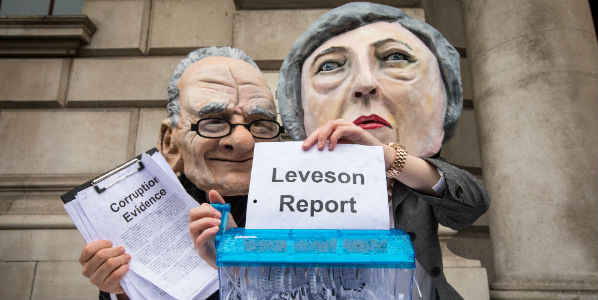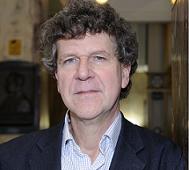The government scuppers Leveson Part 2: is Britain’s press undermining democracy?
Recent amendments to the Data Protection Bill, supported by the House of Lords and then narrowly defeated in the Commons, would have revived Part 2 of the Leveson Inquiry into unlawful conduct and corporate cover-ups in national newspapers. Steven Barnett argues that in opposing Leveson Part 2 the government has surrendered to press lobbying, betrayed promises made to the victims of phone-hacking and undermined the public interest.

Campaigners for Leveson 2 outside the Department for Culture Media and Sport, 2017. Picture: Avaaz/Public Domain
Almost exactly five years ago, the veteran Guardian columnist Martin Kettle posed a question about where power lies in contemporary Britain. While 40 years ago, he said, the central political issue was trade union power, the focus had shifted today to Britain’s unaccountable press: yesterday’s trade union barons have been overtaken by today’s press barons, who ‘ultimately believe in their own unrestricted power – though they call it freedom’.
Last week saw the most recent – and perhaps the most transparent – evidence of that political dominance, as the press succeeded in closing down a public enquiry into widespread criminality and wrongdoing within their own industry. It was a brutal demonstration of naked power which – had it occurred in any other industry – would have provoked outrage in editorial columns. Instead, we saw ministers and (mostly) Conservative MPs and peers falling over themselves to convince both Houses of Parliament that a ‘free press’ was threatened by completion of the Leveson Inquiry.
A great deal of disingenuous and inaccurate rhetoric has surrounded this debate, so it’s worth a quick recap. The Leveson Inquiry – prompted by revelations about News of the World journalists hacking the phone of murdered schoolgirl Milly Dowler – was established with an explicit two-part remit. Part 1 was designed to look generally at the culture and practices of the press with a view to recommending an effective regulatory framework that was compatible with press freedom. But it was barred from addressing the detail of precisely who authorised, committed or was a party to unlawful activity, to avoid hampering police investigations and prejudicing subsequent criminal trials. Many questions were left unasked or unanswered in the full expectation that they would be covered in Part 2 – which had been personally promised by then Prime Minister David Cameron to victims of press abuse.
There might, conceivably, have been a case for reneging on that promise had the full scale of illegality and unethical conduct been exposed during Part 1 or the trials. But in the intervening six years, it has become increasingly clear that these investigations have barely scratched the surface of the scale of wrongdoing and subsequent cover-up, or the number of publications involved.
Consider the evidence. Since Part 1 reported, Mirror Group Newspapers (MGN) has admitted phone hacking on all three of its titles over a ten-year period, and paid out huge sums to victims in compensation. But not a single MGN editor or senior executive has been held accountable. Murdoch’s News UK has also paid out huge sums in respect of phone hacking on the Sun, without either admitting or denying guilt. Just three weeks ago, during yet more court hearings relating to the Sun, specific allegations were made about complicity of senior executives in a ‘hub of illegality’ which involved paying for the private medical data of victims of terrorism, murder, miscarriage and cancer. Meanwhile, John Ford – employed for 15 years by the Sunday Times to steal private data through ‘blagging’ – has turned whistleblower and detailed some of the shocking things he was employed to do by the paper: stealing confidential utility, phone and financial records of high profile individuals, frequently without a shred of public interest justification.
Any illusions that unethical practices are purely historic were shattered last month by the Kerslake report into the Manchester bombing, in which the relatives of victims described – entirely unprompted – the gross intrusions they suffered at the hands of the press, including medical staff being impersonated and children being intercepted on their way to school. Figen Murray, the mother of one of the victims, Martyn Hett, wrote personally to MPs and peers in advance of last week’s parliamentary debates describing in excruciating detail how journalists had knocked on her front door and given condolences to her 16-year-old daughter even before her brother’s death had been confirmed.
Nor, it seems, has unlawful activity stopped. Ford told the Culture Media and Sport committee in March this year that ‘I still know people in the illegal data theft industry, and specifically….I know individuals who are still engaged in these activities on behalf of newspapers.’ All this evidence and much more was to be properly scrutinised during Leveson Part 2.
Attempting to justify what amounts to government collusion in a monumental cover-up, Culture Secretary Matt Hancock argued in the Commons last week that Part 2 would be too ‘backward-looking’. But the amendments to the Data Protection Bill that would have revived Part 2 of the inquiry had specifically charged it with looking at problems of fake news and social media, as well as examining the efficacy of current regulatory practice. It would not only have helped to flush out the manifest untruths and corporate malpractices of the past, but make recommendations that could help to engender trust in UK print journalism that languishes – by some margin – at the very bottom of Europe’s league table.
Hancock also tried to defend his position by talking up the newspapers’ own regulator the Independent Press Standards Organisation (IPSO), suggesting that it had new and tougher regulatory powers, as well as a brand new ‘compulsory’ arbitration scheme. Unfortunately, its powers – of fines and investigations – have never once been used in its four-year existence, and its compulsory arbitration scheme is a chimera: any publication can opt in or out at will, and those which loudly announced their participation can be guaranteed to leave once the parliamentary glare subsides. In practice, IPSO is a puppet regulator, owned by the newspapers and serving the same purpose as its discredited predecessor, the Press Complaints Commission (PCC): to provide a fig-leaf of regulatory respectability to an industry which is resolutely determined that it will remain accountable to no-one but itself.
This matters not just because there will now be more victims of press wrongdoing, nor because hundreds of grassroots journalists will continue to be compromised by editors and executives who routinely ignore their industry code, nor even because we have missed an opportunity to restore faith in British journalism’s battered reputation. It matters primarily because, once again, Britain’s political leaders have abdicated all political responsibility to stand up for the public interest. Twenty-five years ago, when the Calcutt Committee produced an equally scathing report on shocking press behaviour and editors pleaded for one last chance at self-regulation, the press successfully finessed Calcutt’s moderate recommendations and John Major’s government was too weak to challenge their defiance. The phone-hacking scandal was a direct result of that cowardice.
Now, once again, we see a spineless government, craving political support from newspaper editors, feebly mimicking inanities about a ‘free and fair press’ – as if a public enquiry into corruption, perjury, police collusion and subsequent corporate cover-ups would remotely interfere with either fairness or freedom. Yet again, our elected representatives have capitulated to the one industry that seems permanently to escape the kind of scrutiny that it rightly demands in every other walk of life.
For a government to be in thrall to unelected newspapers editors is bad for journalism. But it is dreadful for democracy.
This article gives the views of the author, not the position of Democratic Audit.
About the author
 Steven Barnett is Professor of Communications at the University of Westminster.
Steven Barnett is Professor of Communications at the University of Westminster.





 Democratic Audit's core funding is provided by the Joseph Rowntree Charitable Trust. Additional funding is provided by the London School of Economics.
Democratic Audit's core funding is provided by the Joseph Rowntree Charitable Trust. Additional funding is provided by the London School of Economics.
Excellent commentary.
Surely our problem is that we leave it to Parliament to set the rules for democracy. – (Turkeys / Christmas as with press self-regulation). We need a completely independent statutory body to be responsible and committed to improving and regulating UK democracy. At one level, it could be that MPs would welcome it.
The Home Office informs new UK residents that our number one principle is democracy. Who’d have thought it?